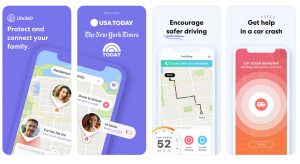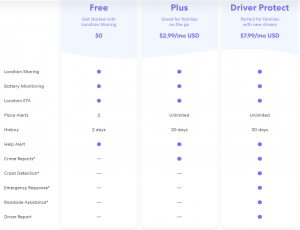Life360
By Anonymous | June 18, 2021
Life360 is a location-sharing app that started in 2008 and has since accumulated 27million users. They claim their mission is to “help families better coordinate and stay protected” by allowing for open communication and complete transparency that allows for frictionless coordination when managing hectic schedules. However, the actual effect this app (and other tracking apps) has on families– especially parent-child relationships– goes far beyond coordination.

Safety
One of the main selling points of the app is its safety features. Life360 operates on a Freemium basis where it’s free to download and use, and users can pay extra to gain access to additional features. As a non-paying user, users have access to live location updates, driving speed, cell-phone battery levels, and saved places. Paying users have additional roadside assistance, driving alerts, crash detection, automatic SOS, and access to 30-day travel histories. These features appeal especially to parents who want to make sure their kids are staying safe and out of trouble. However, as one can imagine, it can also end up being overbearing as well. A parent may call out their child for speeding by looking at their maximum speed during the drive, when they were only speeding for a few seconds to overtake a slower car. Although the app provides features meant to increase safety, the excessiveness of these features may actually result in a false sense of security as children try to find ways around being surveilled. Kids may choose to just leave their phones behind when going out and end up in an emergency situation without a way to contact their parents. Parents end up outsourcing the responsibility of keeping their children safe without actually investing time and energy in creating a healthy dialog. Alternatively, there have also ben cases where kids secretly download the app onto their parents’ phones to notify them when their parents are coming home.

Invasion of Privacy
Children do need regular parental supervision, but there is a fine line between parental supervision and parental surveillance. Adults today are more active in managing their kids’ lives than ever before and despite the strong deference to parental freedoms and parental rights by our legal system, using Life360 to monitor kids this way may well be an invasion of privacy. In a regular setting, individuals are able to make choices about whether or not they want to use the app or turn on their location. However, in the parent-child context, children are often dependent on their parents and must do as asked. Realistically, as long as kids are living at home, there isn’t real privacy. Even when they’re college students, as long as they’re financially dependent on their parents, they don’t have the full freedom to choose.
Impact on Parent-Child relationships
Installing an app like Life360 on a child’s phone may impact their trust or ability to practice independence. The convenience and peace of mind that parents gain from being able just check the app whenever they want comes at the cost of communication with their child and important focus needed for building a real relationship. Children no longer get to experience the same freedoms their own parents had of just being “back by dark” and are instead pushed to follow schedules that always keep their parents in the loop. This kind of surveillance adds unnecessary stress where even if they aren’t doing anything harmful, kids are pressured to notify their parents about anything unexpected that comes up– stopping for ice cream, dropping things off at a friends’ house. The app’s presence leads kids to feel like they’re constantly being watched, even if their kids aren’t always monitoring. Even from the parents’ perspective, there are some things they would rather not know. For example, if the app reports to them that their child is speeding, it becomes difficult to ignore the piece of information they’ve received. The use of tracking-apps may also indicate a lack of faith in children and end up being very disheartening and discouraging. It can make children less likely to confide in their parents when problems arise outside of the app’s scope of detection.
Is There a Solution?
Life360 is a prime example of how there is always the possibility of well-intended tools to be misused or have unintended consequences. The availability of such a product has the power to shape parent behavior as parents who may not have previously thought such a product was necessary now feel like they should use them simply because it is now an option. They are likely to jump in with the idea that having safety measures is always better without fully understanding the possible repercussions of using the app. Additionally, the presence of so many features give parents the pressure to utilize and check all of them. A “crash detection” feature immediately causes parents to stress out and get anxious more than normal. The app can change people’s behaviors in ways that likely were never intended, adding stress to both parents’ and children’s lives. It can work well for adults who can make their own decisions about whether or when to use the app. They can ensure safety when walking home at night and easily share their location if lost or stranded. But when it comes to parent-child relationship, the dynamics of the relationship makes the use and consequences of the app complicated. This brings to question what kind of responsibilities the creators of these apps have. Or does it fall entirely to the user to make sure the app is used responsibly?
https://www.wired.com/story/life360-location-tracking-families/
https://www.life360.com/privacy_policy/https://www.theintell.com/news/20190809/tracking-apps-spark-debate-over-protection-and-privacy/1
https://www.forbes.com/sites/thomasbrewster/2020/02/12/life360-comes-at-you-fast–cops-use-family-surveillance-app-to-trace-arson-suspect/?sh=5518dbd5380a
